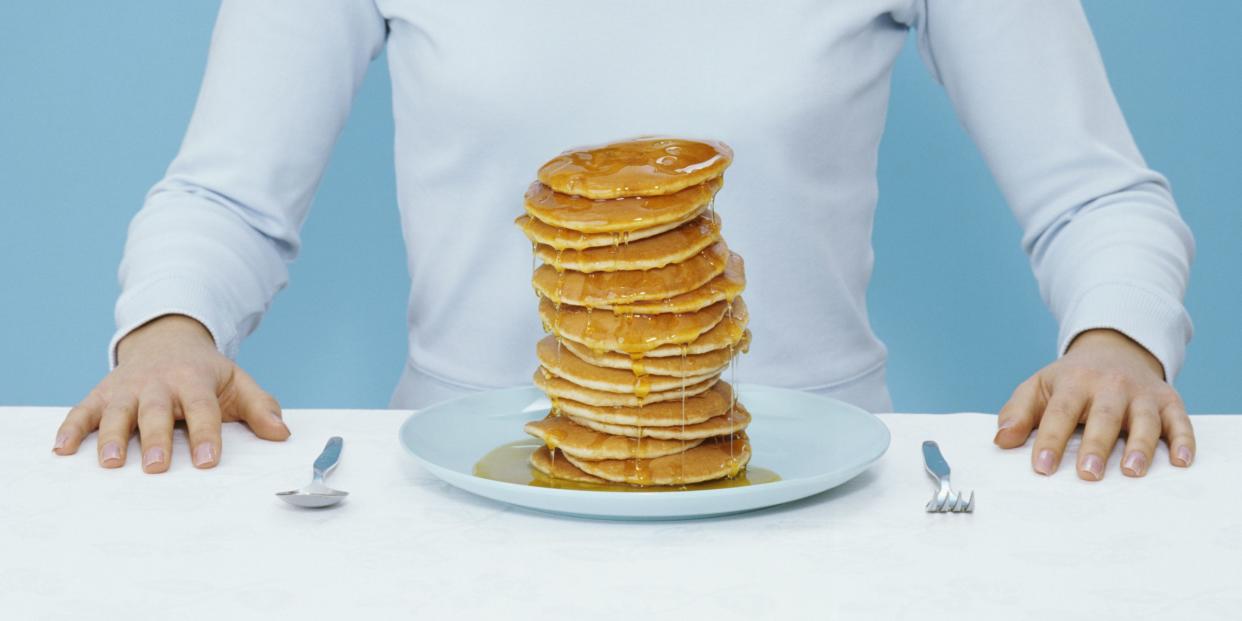This Nutritionist Wants You To Steer Clear Of Reverse Dieting

One of the latest diet trends to resurface this year: reverse dieting. The eating plan is typically used by bodybuilders or weight class athletes (think: boxers). But more recently, a nutrition coach to Hilary Duff credited reverse dieting for the actress' toned figure. And one of Kim Kardashian's trainers, Melissa Alcantara, previously praised reverse dieting in one of her jaw-dropping before and after photos.
But if there's anything you can learn from diet trends and social media, it's to do your research before hopping on the bandwagon. What works for someone else doesn't mean it will necessarily work for you. And in this case, reverse dieting isn't typically recommended for non-athletes, despite the trendiness, says registered dietitian Cristina Rivera, who is president of Nutrition in Motion.
What's more, there is little to no research on the eating method and its effectiveness for weight loss purposes. While some fans claim reverse dieting is a great way to boost energy levels, increase metabolism, and lose weight, Rivera would caution anyone considering it to try a more intuitive eating method first.
That being said, if you're dead-set on giving reverse dieting a try, let's make sure you have all of the facts—from how it works, to major cons, and everything in between.
First: What is reverse dieting?
"In a nutshell, people refer to it as the diet after the diet," Rivera explains. Why? Because many pro athletes will first go on a highly restrictive diet for months to make their weight class or competition goals. Then, to avoid rapid weight gain post-competition and ease out of their restrictive plan, they will reverse their diet, or gradually increase the amount of calories they're consuming.
By doing this, the idea is to counter developing what's called a "famine metabolism"—or when your metabolism slows because your body is hanging onto the small amount of calories its getting from a low-cal diet—and boost your resting metabolic rate (or the number of calories your body burns at rest), helping you to burn more calories during the day.
Remember: After being on a restricted diet for an extended period of time, your body will start conserving energy, and your resting metabolic rate will slow down. Increasing your calorie intake, as recommended in reverse dieting, will supposedly give your body the boost it needs to start burning more calories again. "If it's done in this manner, theoretically, you can return to your normal calorie intake without gaining back weight or body fat," Rivera says.
So, can you lose weight with reverse dieting?
To be honest, the research isn't there to say one way or the other. The theory is that by shifting your calorie intake drastically like this will keep your metabolism flexible and responsive, and you'll be able to maintain the weight loss you've already achieved.
That's a possibility for some, but not a guarantee, Rivera says. But it's worth pointing out that there's no research to show you will lose additional weight by reverse dieting.
Are there any other benefits to reverse dieting, you're wondering? Other than a possible boost in metabolism, your body may also experience an increase in energy. "Anyone who's ever been on a restricted calorie diet knows that you can feel drained—like you just want to sleep," Rivera says. It only makes sense that if you increase your energy intake (calories), you will have more energy.
Who should try reverse dieting?
Rivera doesn't recommend reverse dieting for anyone whose isn't a bodybuilder, boxer, or weight class-specific professional athlete. And even then, she's wary of its effects.
Rivera also advises people with anxiety, depression, kidney issues, or a history of disordered eating to *steer clear* of this eating method. You can run the risk of exacerbating those conditions.
How do you even do reverse dieting?
If you don't fall into any of the camps above and really want to give reverse dieting a try, you don't want to all of a sudden up your calorie intake with no direction. "It's recommended to eat 50 to 100 extra calories a week until you're at your pre-diet calorie intake," Rivera says.
But there's really no magic number or rate of calorie increase to follow (remember: there isn't much research on reverse dieting!). When Rivera is transitioning someone out of a low-calorie or restrictive diet, she typically increases their caloric intake by 250 to 350 calories per week. But it's very individualized—which is why it's important to work with a registered dietitian in any scenario where you are drastically changing your calorie intake.
Some people need more calories sooner because they'll get really hungry, Rivera explains. "Others may get a lot of gastrointestinal distress [when you introduce too many calories again too soon] because, when you're on a low-calorie diet and you lose weight, your digestion gets very slow." And when you introduce more calories, your body might get bloated, or you could experience uncomfortable stomach aches.
That's why Rivera recommends consulting an RD before doing reverse dieting—or coming off of any low-calorie diet, in general.
The bottom line: Reverse dieting isn't recommended for the average healthy adult looking to lose weight. If you want to try upping your calories, do so with the guidance of a nutrition professional.
You Might Also Like

